Fueled by a combination of popularity, curiosity, necessity, strategy, and trendiness, marketers are embracing a new recipe that injects a proactive, social approach to outbound communications and engagement – with or without all of the answers before they jump in. This approach, while courageous, has required faith, conviction, and champions who didn’t necessarily have access to metrics and case studies at the SMB and enterprise level. Many of the most and also least effective campaigns were implemented as a way of learning. As we all know, some Social Media campaigns have excelled while others have publicly flopped and contributed to the cynicism and fear of embracing a transparent form of open and public dialogue.
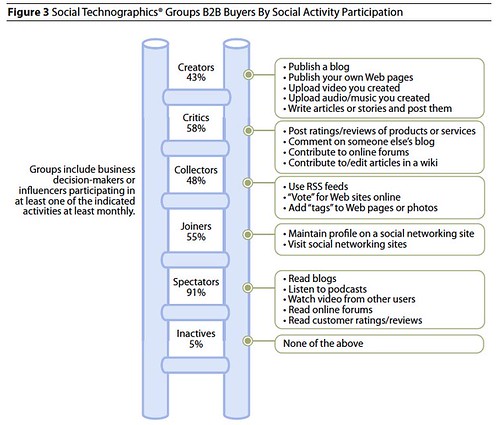
While dollars evaporate from traditional budgets previously earmarked for advertising, public relations, events, and other ROI elusive programs, the general sentiment seems to recognize Social Media as a cost efficient experiment for maintaining visibility without falling completely off the radar screens of potential customers, stakeholders, and influencers.
Forrester’s Jeremiah Owyang recently published a report that showcased business-to-business organizations were ready to increase marketing spending, especially in a market downturn.
His question was direct and the answers were incredibly telling, “Assuming that the economy is in recession in the next six months, how would you change your investment in social media overall?”
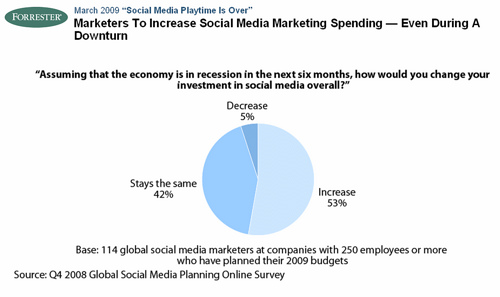
Credit: Jeremiah Owyang, Forrester via flickr
Only 5% responded that they would decrease spending, which tells me that a minority of companies polled was practicing social media using questionable methods that didn’t make an impact. 42% would stay the same, which isn’t necessarily revealing how companies are practicing social media, if at all, compared to traditional efforts. Perhaps most staggering, however, is that a massive 53% intended to increase their investment during a recession.
I wonder if companies are embracing social media because they believe that communities can benefit from their direct participation and associated experience, or rather because social media is viewed as a lower cost alternative to traditional marketing and advertising.
Jeremiah and Forrester aren’t alone in their assessment that Social Media marketing is on the rise during a recession. In a report published by Aberdeen Group, marketers have developed the tools and methodologies to drive marketing ROI by listening to and learning from customers and prospects.
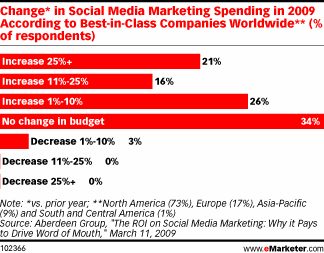
Aberdeen learned that 63% of surveyed companies intended on increasing social media budgets in 2009.
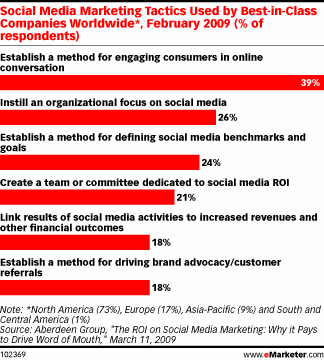
The recent report also dissected the programs that companies worldwide were currently practicing. 39% claim to establishing a method for engaging consumers in online conversations. 26% instilled an organizational focus on social media, meaning that internal champions demonstrated the need and benefits for integrating socialized programs into the existing mix. 24% substantiate benchmarks and goals to effectively measure their programs. 18% can tie the results directly to sales.
I recently presented at a MarketingSherpa forum where we discussed and presented strategies and tactics to build and shape a brand using social and traditional methodologies and programs. My co-presenter Sergio Balegno of MarketingSherpa shared research from a Social Media Marketing and PR Benchmark Survey fielded in December 2008. I’ve been given permission to share some very interesting numbers with you…
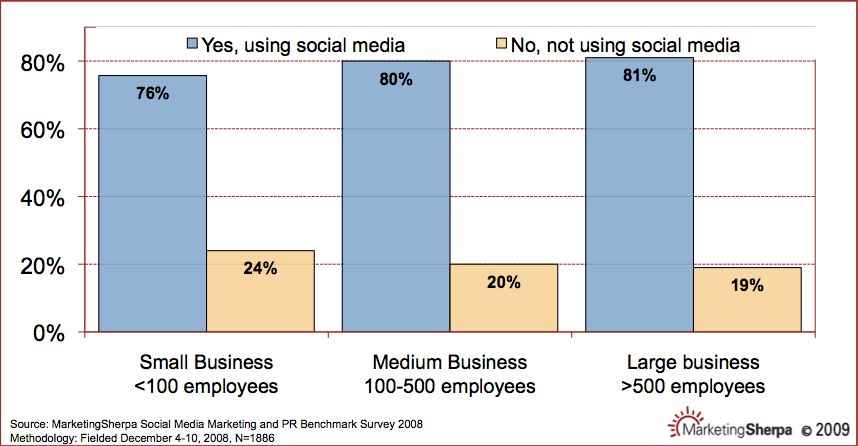
Businesses across the board have claimed that they’re embracing and practicing some form of social media in outbound marketing. Again, whether or not they’re practicing effective, noteworthy, measurable or even exemplary social initiatives are unclear. But as you can see, a round average of 80% reported that social media programs were indeed in effect.
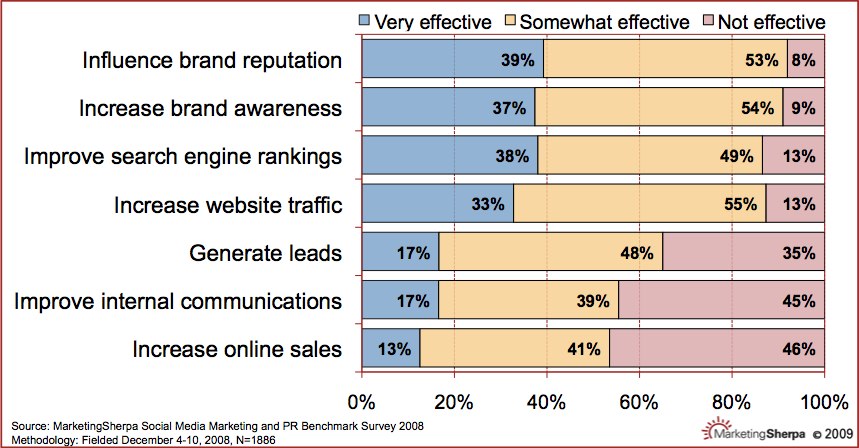
Brand managers and the executives signing the paychecks continue to evaluate the effect of Social Media on everything from brand reputation, awareness, SEO, website traffic, leads, internal communications, and online sales. According to MarketingSherpa, social media had a positive impact ranging from 50% to over 90%.
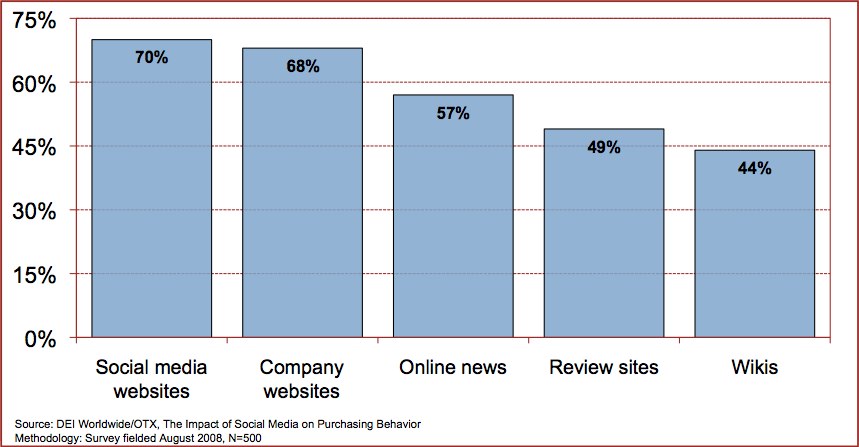
The study also revealed where consumers reported obtaining information regarding brands. 70% attributed social communities and networks as their primary source, which notched higher than the company site. Online news and review sties ranks third and fourth. Although after review, I would most likely move wikis to the far left column, which would also send that number potentially higher.
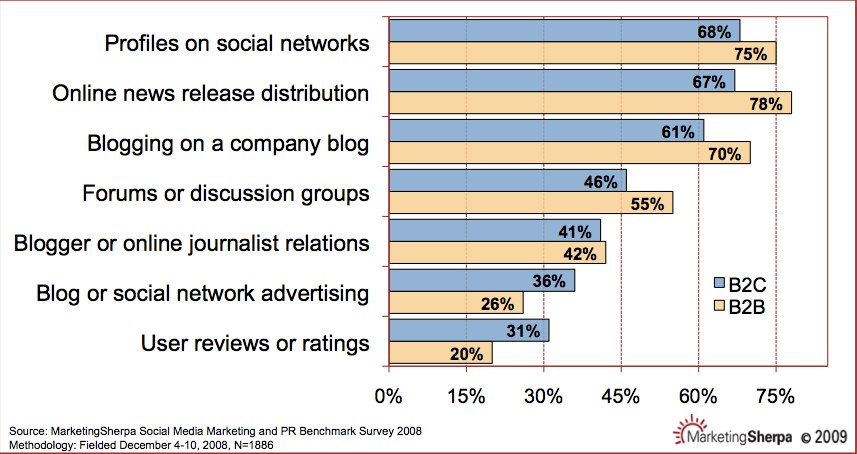
Many pundits have claimed that the derived benefits from implementing social media initiatives were clear in B2C cases, but wondered whether or not social media could help the B2B sector. As those who’ve worked in enterprise marketing or sales will resoundingly emphasize, B2B is driven by relationships, which is triggering the integration of social systems into CRM. All successful social media case studies share their roots in the intent and delivery of information as they contribute to forging, cultivating and adding value to relationships.
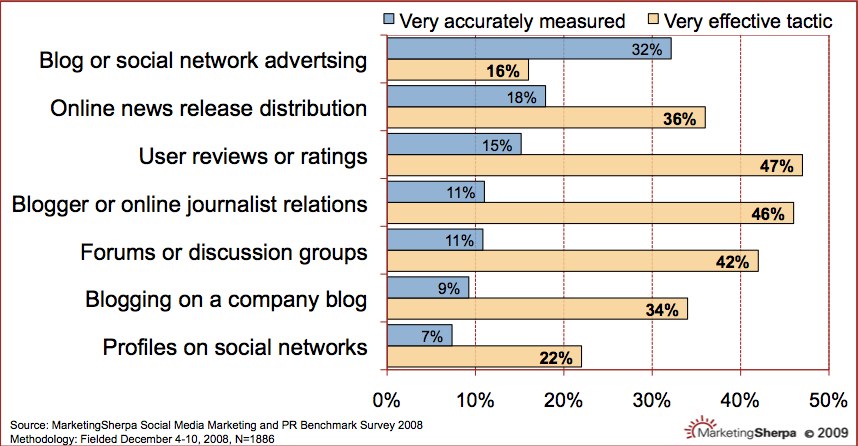
The study noted that sometimes the most effective social media tactics were also the least measurable and contrarily, the activity behind least effective programs was sometimes the easiest to measure. In many of the programs I work with today, we have focused on the ability to both implement effective programs measure them specifically for each division they impact, from sales, to service, to marketing.
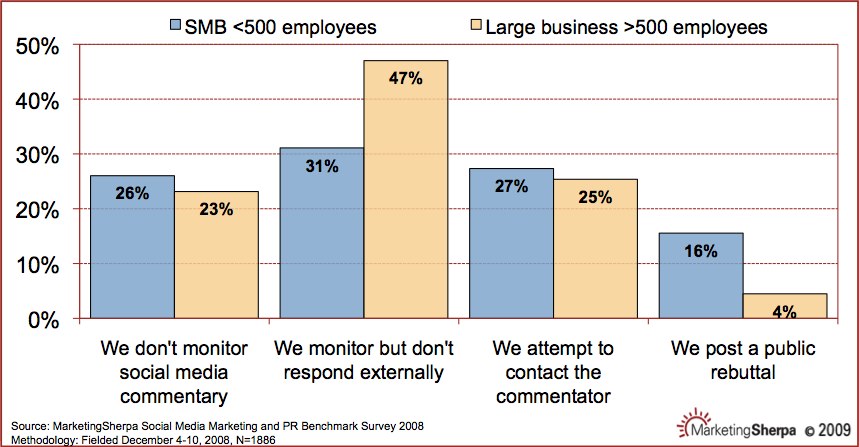
Responding to negative commentary associated with the corporate or product brand is not an exact science, nor is its specific tactics duplicative from company to company. What’s common however, is that listening and observing is the key to learning. In many cases, there’s merit to the complaints and many times they require acknowledgment, response, and a commitment to fix things internally to improve a product or service that doesn’t simply address the views of a few vocal people, but also those unspoken groups they represent. With the right counsel, I expect to see the numbers in the first two categories on the left significantly decrease over the next year while the numbers on the right increase.
While numbers indicate that Social Media Marketing may, for now, be recession proof, it is not idiot proof. Engaging in transparent conversations in social networks to build brand-centric communities is meaningless without intelligence, sincerity and a real world business acumen that can tie participation to important business metrics.
Listening, observing, and learning is the key to creating any informed social or traditional program that links insight to relevant and consequential outbound engagement.
Overall, this is exactly the level of detail that many brand, marketing, service, and public relations professionals need to review in order to assess opportunities, risks, and benefits associated with the implementation of strategic and effective day-to-day engagement programs that are unique and tailored to each brand.
Helpful Posts on PR 2.0:
– Facebook Now 200 Million Strong
– Twitter Traffic Surges to 10 Million
– The End of the Innocence
– The Social Effect
– The Conversation Prism 2.0
– Putting the Public Back in Public Relations is Now Available
– Twitter and Social Networks Usher in a New Era of Social CRM
– The Human Network = The Social Economy
– In the Statusphere, ADD Creates Opportunities for Collaboration and Education
– Humanizing Social Networks, Revealing the People Powering Social Media
– Social Networks Now More Popular than Email; Facebook Surpasses MySpace
– Are Blogs Losing Authority to the Statusphere?
– I Like You
– Tracking Brands on Twitter to Improve How You Listen and Engage
– The Ties that Bind Us – Visualizing Relationships on Twitter and Social Networks
– Make Tweet Love – Top Tips for Building Twitter Relationships
– The Battle for Your Social Status
– Twitter Tools for Communication and Community Professionals
– Is Twitter a Viable Conversation Platform
– Is FriendFeed the Next Conversation Platform
Connect with me on:
Twitter, FriendFeed, LinkedIn, Tumblr, Plaxo, Plurk, Identi.ca, BackType, Social Median, or Facebook
—
Subscribe to the PR 2.0 RSS feed.
![]()
—
Now available:


—
pr pr+2.0 pr2.0 public+relations marketing advertising interactive social+media socialmedia brian+solis social media media2.0 media+2.0 2.0 smo social+media+optimization marcom communication publicity brand branding crm scrm relationship conversational conversation aberdeen forrester jermiah+owyang b2b b2c enterprise consumer marketingsherpa stats report statistics case+study numbers metrics measurement emarketer



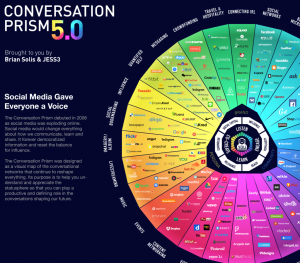


Thanks Brian for another great post! It’s about time businesses got the message: social media is here to stay and deserves their attention. The marketing potentials on social media are simply limitless.
Brian,
Interesting and informative post as usual, however I do wonder a bit about what the Forrester data really tells us. First, the chart is a survey of 114 social media marketers. This omits companies that might not have such a position; it also stacks the deck a bit (wouldn’t we expect people who focus exclusively on social media to be optimistic about their budgets? What else would they spend their budgets on? Might they use surveys such as this to send a message to others that their budgets should be growing?).
Furthermore, these social media marketers are asked if they themselves would change their budgets. It’s probably not up to them.
Also, I’m not sure about one of the inferences. The 5% who are reducing their budget may be doing so because of company-wide budgetary pressure (if you’re the social media marketer at GM, for instance, the success or failure of your programs probably won’t save your budget right about now).
This is not to take away from the larger point, however. Clearly social media is increasingly being recognized for its marketing potential.
thanks for this. I’m doing a workshop on Social Media next week so very timely! I’ve ‘borrowed’ a couple of your slides so will ensure you get a reference as well as the original sources.
Thanks
Russell
Intriguing post. I’ve been corresponding with a lot of agencies and brands lately and a lot of them still dont understand the ‘best’ way to approach social marketing. For most its a medium that is popular and it will supposedly save them ‘money’. Only a few understand that social media is not just a form of ‘marketing’ its a form of communication and dialogue with their customers and potential customers. Launching a campaign and staying quiet isn’t enough – once you step into that space – you must keep at it. However, it’s good to see that brands/companies are seeing the importance of tapping into this arena. I hope they are all prepared to swim or stay in float and not drown in the ripple affects that come with such a medium.
Hi Brian,
Really deep research and good knowledge about social media. I am 100% agree with you social media is most powerful tool for any businesses. I have posted a poll where I got shocking results as follow.
http://polls.linkedin.com/poll-results/32838/rqqpz
Best method for the international business development in IT is?
Cold Calling – 6%
Mass Emailing – 6%
Social Media – 68%
Approach previous customers – 0%
SEO – 18%
Thank you all.
Warm Regards
Nayan Sagar
http://www.linkedin.com/in/nayansagar
One social marketing media that is growing during recession is through web comments. For eg advertisors can use tools like “commentino”, with the help of their writers, can promote their business through web comments. Writers post the comments in right forums to keep forum discussion objective intact. This also give forum participants more choices. This is quite effective marketing for medium/small size companies. For commentino details follow link
http://snipr.com/mf6jo